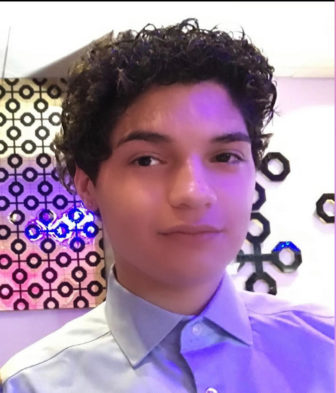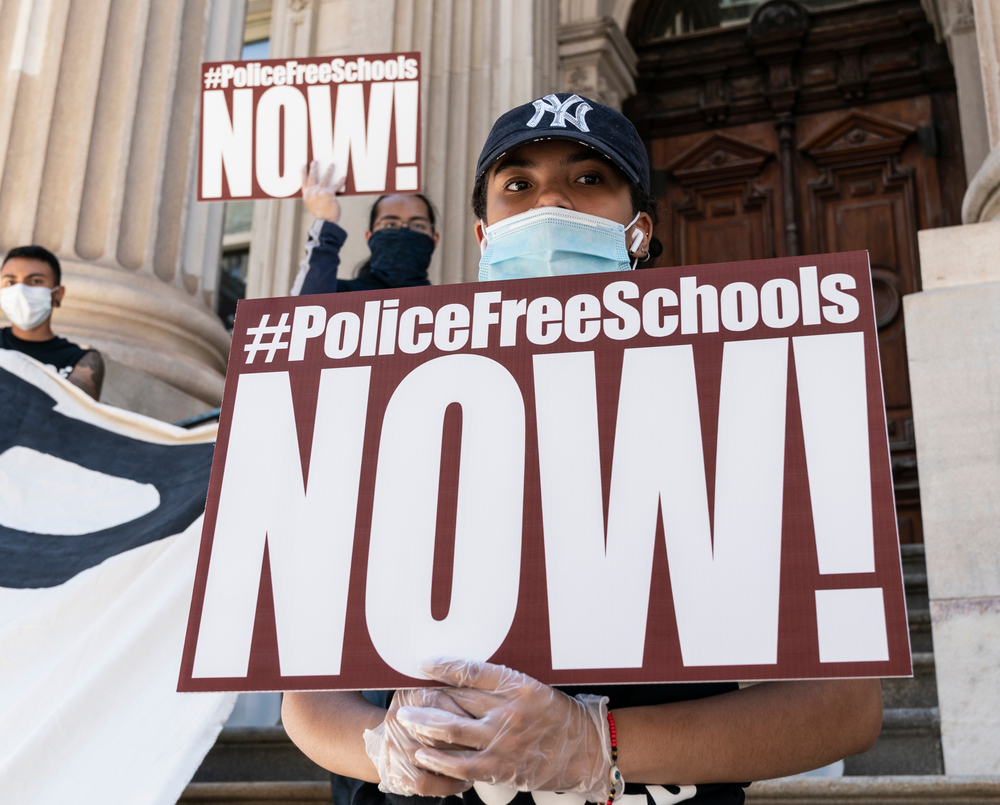![]() Every day, I walk into school greeted with silencing stares from armed police officers. They’re not facing the windows or the doors looking out for a stranger who could walk in and hurt my friends and me. Their eyes are on us, not some external threat. We walk past them silently, afraid that anything we do or say will be perceived as a “threat” that will lead to suspension, arrest or worse, physical harm.
Every day, I walk into school greeted with silencing stares from armed police officers. They’re not facing the windows or the doors looking out for a stranger who could walk in and hurt my friends and me. Their eyes are on us, not some external threat. We walk past them silently, afraid that anything we do or say will be perceived as a “threat” that will lead to suspension, arrest or worse, physical harm.
Our schools have normalized this fear by allowing officers to patrol our hallways and criminalize us. In my county, a police officer was celebrated for tasing a Black freshman girl three times inside her school cafeteria. How can I ever trust that there will be justice if I am hurt by a police officer in my school when they are never held accountable and their violent behavior continuously goes unchecked? Instead of providing critical resources for teachers whom students trust, districts are lining the pockets of violent police officers.
As a society that views police funding as a public good, we are expected to believe that police officers keep us safe. But as students who attend schools patrolled by police, our experiences with school resource officers have made clear that we should reconsider this belief. The Columbine, Virginia Tech and Marjory Stoneman Douglas shootings all took place in schools where armed police were present; and still innocent students, teachers and administrators were needlessly killed.

Jasiah Villalta
In fact, my school is just 178 miles from Parkland, Florida, where a gunman entered a school and killed 17 staff members and students. Instead of trying to protect the people at Marjory Stoneman Douglas, one resource officer refused to investigate gunshots and directed law enforcement to stay away from the building as people were being hunted down. He did absolutely nothing to protect or prevent 17 people from losing their lives.
Today’s education system is failing students by criminalizing us and funneling us into the school-to-prison and deportation pipeline. School policing criminalizes typical youthful behavior, which involves arresting and ticketing students for low-level violations like “disorderly conduct” or disturbance. These tactics by school police are especially harmful to Black and immigrant students of color and students with disabilities, who face harsher penalties compared to their white counterparts.
Data shows that in 2018-19, Black students in Florida were suspended and expelled at higher rates than white students. Despite making up only 22% of K-12 enrollment, Black students comprised 34% of statewide expulsions (without continuing education services), 40% of expulsions (with continuing education services), 37% of in-school suspensions and 40% of out-of-school suspensions. White students comprised 37% percent of K-12 enrollment, but were under-represented in all but one of those categories.
We need police-free schools
If school resource officers are here to keep us safe, why do they continue to harm? In January a school police officer body-slammed a teenager to the ground and handcuffed her while she was unconscious. In Pasco County schools in West Coast Florida, the district partnered with the local sheriff's department to use students’ GPAs to identify students who are “destined to a life of crime.” In Orlando, Florida, a 6-year-old was arrested and fingerprinted for having a “tantrum.”
And in our schools, our peers are interrogated and questioned every day just for walking to class. It’s clear police officers don’t keep us safe. It is past time to end this cycle of violence and remove the officers who harm us and perpetuate violence within our hallways.
We believe that classrooms should be safe places where we can invest in our future. We believe that we should go to school without the fear of police interrogating, arresting or attacking us. We believe in police-free schools and supporting the Youth Mandate for Education and Liberation.
Young people like us, not just in Lake County, Florida, but across the country, are speaking up because we know this vision for a liberatory education system is possible. This is a system based on principles of inclusion, equity and racial justice, free of policing and incarceration. Following the death of George Floyd, school districts in Minneapolis; Los Angeles; Portland, Oregon; Denver, and Oakland, California have taken action toward removing police from schools. It’s time for others to follow suit now.
For more information on juvenile justice issues and reform trends, go to JJIE Resource Hub
In the past few years, youth-led organizing like that of the Florida Student Power Network, which I am a member of, has brought the experiences of youth directly impacted by society’s biggest issues to the forefront of political discourse. Youth-led movements like March for Our Lives, the Sunrise Movement and United We Dream have shown the power of youth voices and the impact that we are capable of. We know that youth are the future and we are using our voices to demand a reimagination of policing in schools.
The Biden administration and all levels of government must:
1. fund education, not incarceration
2. restore and strengthen the civil rights of young people in education
3. end the private takeover of schools.
We are further calling on elected officials to support and pass the Counseling not Criminalization in Schools Act to reduce overpolicing and criminalization of students. For the sake of our future, safety and wellbeing, we must end the school-to-prison and deportation pipeline now.
Jasiah Villalta is a second-generation American high school senior and youth organizer with the Florida Student Power Network and Florida High School Democrats. He uplifts underserved communities through grassroots activism in traditionally neglected areas.
